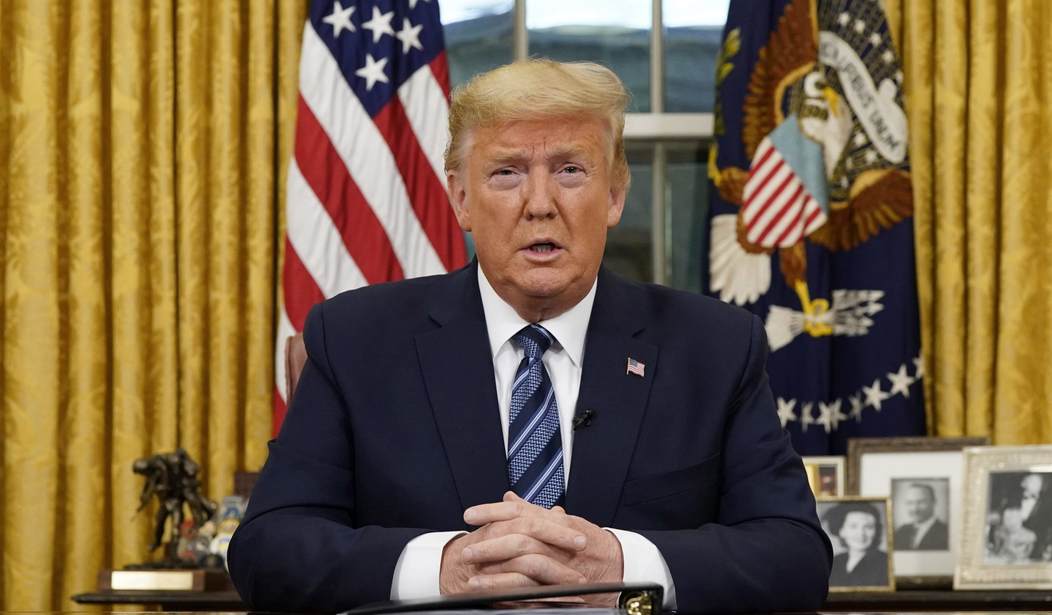On the latest episode of Life, Liberty, and Levin, Mark Levin interviewed the “Deregulation Czar” from the Reagan administration. Christopher DeMuth, currently a distinguished fellow at the Hudson Institute, served under President Ronald Reagan as the executive director of the Presidential Task Force on Regulatory Relief. DeMuth said on Sunday that, instead of centralizing power to the executive branch during the coronavirus response, President Donald Trump has responded with deregulation and decentralization. DeMuth wrote in the Wall Street Journal on April 17 that this is the first time in U.S. history that a president has responded to an emergency in such a manner.
DeMuth decried the increase in power at the executive branch over the past several decades, saying,
Throughout our history, and especially in recent decades, when we encounter a national emergency of some sort, which we tend to do every ten to fifteen years, it has been the occasion for increased centralization of power. That is, the migration of power from the states to Washington, D.C. and the federal government, and within the federal government, from the Congress to the executive branch. Crises and emergencies have not been the only thing compelling the growth of executive government in Washington, it has been a continuous process for about the past fifty years. There are many deep causes for it. But emergencies have certainly been an important part of the story.
He continued by noting that in previous crises, the strong tendency was to create huge new bureaucracies with ever-increasing freedom from oversight. “This centralization of lawmaking power in the executive branch in Washington is a dangerous thing for our constitutional values,” DeMuth said. “It interrupts the competition within government and between the feds and the states, which is an important part of the constitutional scheme.”
The response by the Trump administration to address coronavirus has been a dramatic departure from previous emergencies, DeMuth says:
The federal government has been taking very important leadership steps, but the front-line responders have been governors, mayors, hospitals, medical professionals, and private enterprise. Pharmaceutical and equipment manufacturers … have responded with extraordinary speed in a national mobilization to meet the threat.
Levin asked why the knee-jerk reaction to major emergencies is to abandon the Constitution, noting that Trump came into office as anything but a conservative ideologue. He’s been steadfast, Levin says, in upholding the Constitution and resisting calls from the left to nationalize industry and centralize decision-making. DeMuth said:
I think that part of it is just a logical mistake that many people make. There’s a big crisis. It demands action. In America we always respond to crises a little bit too late. We were late getting into World War I, World War II. Then when we get our act together, we create a ferocious response. People like to think that if we just had a strong central authority that was omnipotent and had tremendous foresight, we wouldn’t have to go through these things. The advocates of a centralized nationalized response to do away with the patchwork response and conflicts and competition among jurisdictions tend pretty heavily to be in Washington, D.C. The national media, of course, would like just one authority to go to. It lowers the cost of their operations.
DeMuth reiterated the point that the east coast media has a strong interest in having a centralized repository for information that downplays the localized response based on local needs. It plays well on cable tv, it makes the news digestible. This also plays in favor of those in the federal government who would like to have more power.
Noting Trump’s background in business as opposed to politics, DeMuth says he can’t imagine any other president mentioning CEOs and business firms by name, parading business executives in the press briefings.
Trump has also strongly embraced federalism and local responses to the crisis, DeMuth says:
If you read the newspapers, you’ll see some people saying, well, he’s just deflecting attention to the states because he doesn’t want to take responsibility, he wants them [the states] to take responsibility. I think that’s not a good answer. I think he realizes that in a crisis like this, the buck stops with the President. He’s going to take responsibility regardless. I think he also realizes that the effectiveness of a uniform national response is unlikely to be satisfactory. That will be especially the case in opening back up.
Jeff Reynolds is the author of the book, “Behind the Curtain: Inside the Network of Progressive Billionaires and Their Campaign to Undermine Democracy,” available now at www.WhoOwnsTheDems.com. Jeff hosts a podcast at anchor.fm/BehindTheCurtain. You can follow him on Twitter @ChargerJeff.
Editor’s Note: Want to support PJ Media so we can keep telling the truth about China and the virus they unleashed on the world? Join PJ Media VIP and use the promo code WUHAN to get 25% off your VIP membership.










Join the conversation as a VIP Member